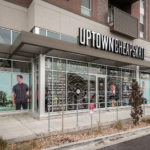CFO of the premier upscale resale clothing franchise in the nation explains why owning a recession-resistant business like Uptown Cheapskate is a smart choice for entrepreneurs
 Whenever society goes through a major experience such as the recent crisis, many entrepreneurs take the time to think about how the next phase of their career will look. For entrepreneurs who are interested in owning an upscale resale clothing franchise that makes a tremendous difference in good times and bad, Uptown Cheapskate is the right choice for you.
Whenever society goes through a major experience such as the recent crisis, many entrepreneurs take the time to think about how the next phase of their career will look. For entrepreneurs who are interested in owning an upscale resale clothing franchise that makes a tremendous difference in good times and bad, Uptown Cheapskate is the right choice for you.
With more than 80 locations in 24 states, Uptown Cheapskate focuses on giving young professionals a place to buy and sell fashionable, name-brand items. Ultimately, we provide a chic and trendy customer experience, and have a commitment to giving back and supporting environmental sustainability. Moreover, not only is there plenty of room in the booming $24 billion resale clothing industry, but the country has seen independent business owners who no longer want to be in business without support scramble for help during this unfortunate time.
This is where Uptown Cheapskate excels. In this wide-ranging interview, Craig Smith, CFO of BaseCamp, shares everything from how our thriving resale clothing franchise’s business model is designed to help our franchise owners maximize profitability, to why franchising is more attractive than ever and what makes Uptown Cheapskate a best-bet investment.
How did the pandemic impact Uptown Cheapskate?
Smith: Although the impact was significant, it wasn’t as deep or long as we anticipated. From the very beginning we communicated with our franchisees and, although we were of great service to them all, I think we played a bigger role with those just joining our franchise family. This includes new franchisees who weren’t open yet, were working through the construction phase or looking to purchase a franchise. The main issues for those ongoing projects were with the SBA, as they stopped funding projects due to the crisis. My role there was acting as a liaison between the bank and the franchisee helping them to answer questions, and create new forecasts that took into consideration how the pandemic would impact their project going forward. In the end, I think I was useful and comforting in a lot of ways because things could’ve been worse.
What procedures and precautions were implemented in store to maintain safety?
Smith: We have about 97% of Uptown Cheapskate open and 90% open on the Kid to Kid side. We’ve provided some general directives with the reopening of our stores. However, we’ve followed the local municipalities our stores are located in to ensure they adhere to the new safety regulations. Early on in the pandemic, we were very aggressive in reaching out to our franchisees to make sure they knew we were on board with all of the safety provisions that were being directed by local government entities.
I think that gave our franchisees confidence that we, the franchisor, is aware of what’s happening and that we support all of those things as well as them. Additionally, we understood that these newly implemented regulations might seem restrictive, but found there are ways to actually make them beneficial. I think our communicating these things and working alongside our franchisees during such a difficult time showed that we not only care, but are also willing to work with the rest of the community to keep everyone safe.
How has the response been from consumers since reopening?
Smith: Honestly, we are shocked about how well we have rebounded because it has exceeded our expectations. I think this pandemic has truly shined a light on our stores because in a down economy, both Uptown Cheapskate and Kid to Kid are needed. The opportunity to be able to sell your clothing and make money off of it, as well as having the opportunity to shop for great clothes at a great price is very attractive to those in a down economy. Additionally, before this happened, the resale industry was already on a fast track upward. I think this pandemic will only accelerate that — and our brands are in a position to be of great service to all of the communities we serve.
This unfortunate time has proved challenging for independent business owners across the nation. What makes the franchising model more attractive than it was before the pandemic?
Smith: There are many advantages to franchising, but having exceptional support behind you is key. For our new franchise owners, being a part of a franchise system has been paramount. They all felt they were in a situation that was desperate. They made huge investment decisions to get into business ownership, and with no fault to anyone, everything seemed to be crashing down. Having the experience BaseCamp has, coupled with our visionary leadership team, we were able to help our franchisees make decisions during a difficult time, which gave them confidence in the system backing them. Overall, we felt pretty assured that we would get through this and everything would work out. And from the response of our franchisees, being a part of a system with the experience we have was very powerful.
Why is now the time to invest in an Uptown Cheapskate franchise?
Smith: Now is the time to invest in an Uptown Cheapskate because all indicators point to it as a great option to invest in. Again, the $24 billion resale clothing industry is growing. Here at BaseCamp, we are very optimistic that our systems are well positioned to be of great service and will be successful as the industry grows. So if you’re looking for an easy-to-understand business model, Uptown Cheapskate upscale clothing resale franchise is a great choice. In addition, financially, this is a great time to invest because the interest rates are as low as they ever will be and more real estate may become available and cost effective as we move forward.
Ready to start your new career as an Uptown Cheapskate franchise owner?
For in-depth details about the Uptown Cheapskate franchise opportunity, download our Free Franchise Opportunity Report. You also can learn more by visiting our research pages.





